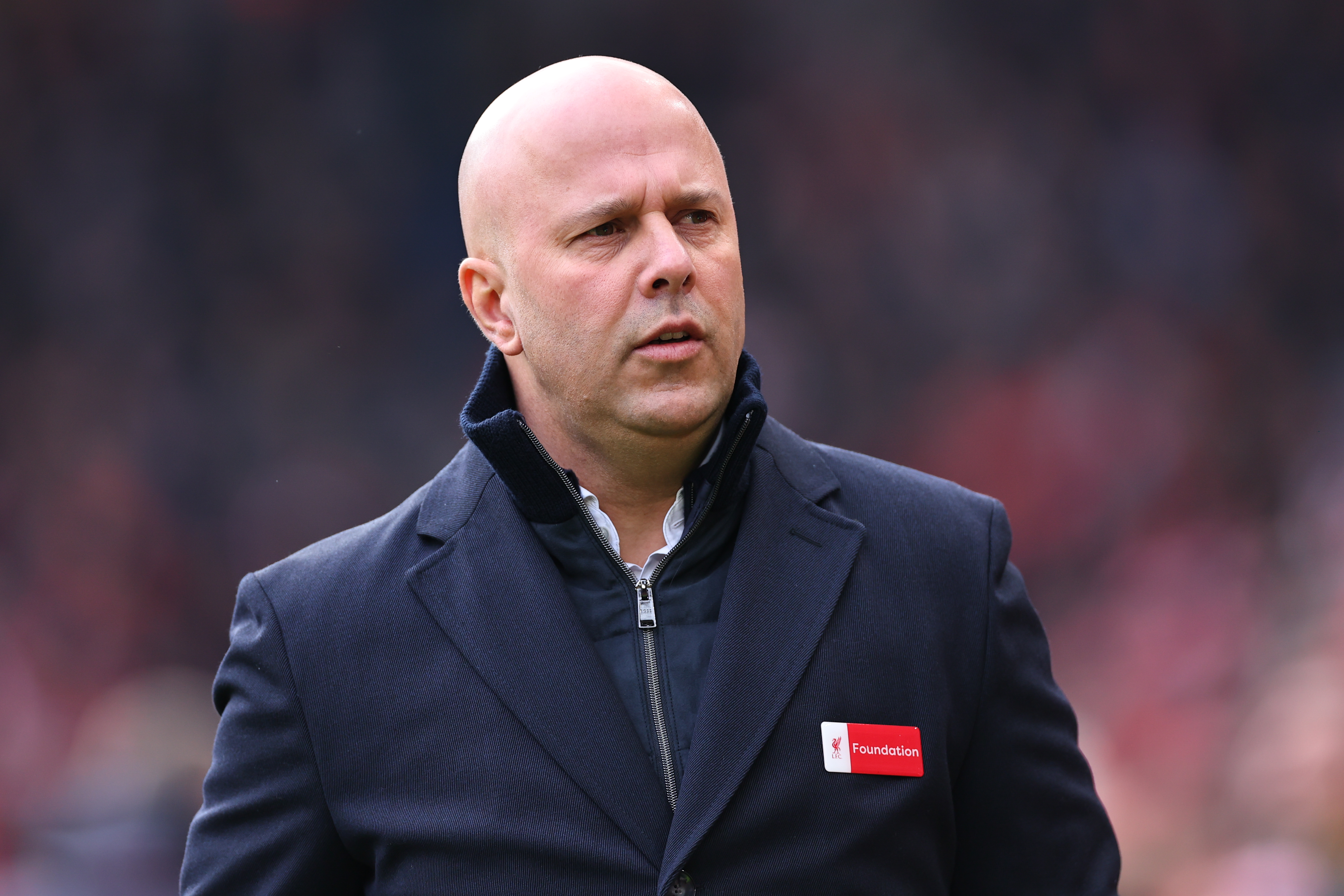More Than A Game: Germany v Holland
Germany and Holland are two of world football's greatest rivals. When the two teams were set to meety at Euro 2004, FourFourTwo presented a More Than A Game special incorporating two views -“ the Dutch and the German -“ on this great, historic rivalry; a true battle, it seems, of good versus evil.
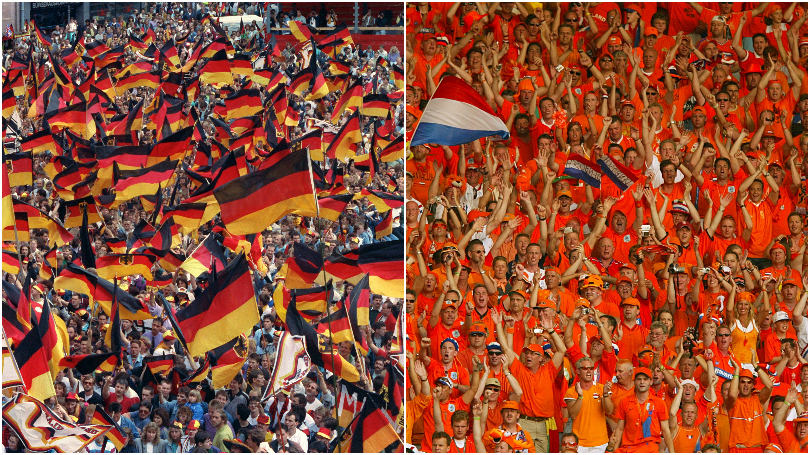
by Uli Hesse, author of Tor! The Story of German Football
Two hours after Feyenoord had beaten Borussia Dortmund 3-2 to lift the 2002 UEFA Cup, I was steering my car through the streets of Rotterdam, trying to leave the place behind as quickly as possible, when the mobile rang.
My friend Bernd had gone to the game on a chartered coach with other Dortmund fans. He knew I was on my own and that I must have left the ground late on account of the press conference. Which is why he feared for my life and limb. "You know," he said, "the sad thing is not that we lost, but that everybody on this coach is glad we did. Otherwise we wouldn't have gotten out alive."
The German Viewpoint
That morning, I'd left my car on the other side of town, because when I called the club to ask about parking, a nice woman told me it wouldn't be safe if it carried a German licence plate.
Then I strolled through the southern part of Rotterdam all day, ignoring police advice that no German should cross the river.
Around noon I saw a Dortmund coach that had lost its way. An elderly Dutchman lifted a small child onto his shoulders so the kid could give the finger to the Germans while men in Feyenoord shirts came running out of a bar, looking for something to hurl at the coach.
Get FourFourTwo Newsletter
The best features, fun and footballing quizzes, straight to your inbox every week.
Later, I heard that a train carrying German supporters had been shot at with a rifle and during the match Feyenoord fans fired rockets into the Dortmund stand.
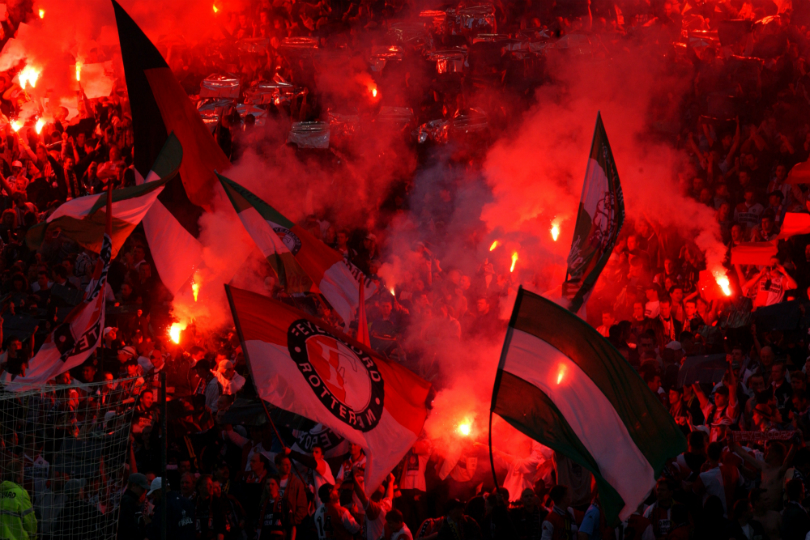
The last time Dortmund had played in Rotterdam, in September 1999, no German fans had made the trip because the club considered it too risky. It may have been an over-reaction, but fresh in the memory was a Feyenoord visit to Bayer Leverkusen that resulted in £180,000 worth of damage as 500 Dutch fans ran riot, smashing whatever was within reach and setting fire to a ticket booth. The police of North Rhine-Westphalia later announced that a third of all football-related arrests in the 1998-99 season had been made at this one game. It was a friendly.
And it's not just Feyenoord. Six months after the Leverkusen riots, Cologne played a pre-season match in the Dutch city of Groesbeek against Nijmegen. When the Germans made it 3-3, the stand with their 300 fans was invaded by thugs. "People could have been killed," gasped a pale Ewald Lienen, then coaching Cologne.
As far as Germans are concerned, you can sum up the situation in two statements. First, Holland-Germany is one of the most heated rivalries in Europe. Second, the mentally unstable party in this explosive relationship are the Dutch.
Nor is it just football. Last September, German third division ice hockey club Ratingen Aliens played host to a team from across the border, the Eaters Geleen. One local paper spoke of "unimaginable hunting scenes", saying the visitors had "sullied the sport' image in an unprecedented manner". Ice hockey is no game for sensitive souls, but 1,000 people chanted "Stop this!" as the Dutch ran amok. After 16 minutes, Ratingen came off the ice.
As far as Germans are concerned, you can sum up the situation in two statements. First, Holland-Germany is one of the most heated rivalries in Europe. Second, the mentally unstable party in this explosive relationship are the Dutch. They not only started this rivalry, they have also carried it to a point where it is obsessive, almost psychotic. "We've played a few friendlies against Dutch teams," says Bochum's goalkeeper with a dry smile. "And we've been lucky enough to get out of them without major injuries." His name is Rein van Duijnhoven. He's Dutch himself.
Yet this second assumption, that it's our neighbours who go over the top, will be taken with a grain of salt by anyone who was in Munich the day England won 5-1.
One of the most crushing defeats in our history seemed forgotten the instant news came through that Ireland had beaten Holland. For the next 10 months, the most popular chant at German grounds was: "We're going to the World Cup without Holland." There was even an (unexpectedly humorous) website called 'You're not there', with an online game where users could knock down orange-clad players by throwing spliffs or clogs at them.
But the German reaction is not always so light-hearted, and it's not always merely a reaction. As early as 1989, there was trouble in Rotterdam when German firms used the occasion of a World Cup qualifier to "invade enemy territory", as they dubbed it on leaflets. Six years later, Bayer Leverkusen and PSV Eindhoven fans fought, not least because, as a Leverkusen fan's online diary notes, "the Germans knew how to provoke the Dutch". For instance by yelling, "Hooray, hooray, the Germans are here", which will sound more ominous to Dutch ears than to some.
What is true is that the Dutch created this rivalry. And for a while the Germans even failed to notice what was happening...
Brewed by the Dutch, killed by the Germans
During the first decades of its existence, the German national team, established in 1908, played Holland more often than any other side, save Switzerland. Germany usually lost, but it didn't rile them. Mainly because they were beaten by all sorts of teams, but also because Holland was a small country that kept a low profile. France was a different matter. When Germany and Holland drew 2-2 in November 1927, it was the 11th game between the two sides - the first Germany-France meeting would not be agreed upon for another three years, such were the enmities.
The first signs that the rivalry was alive came during the 2-2 draw at the 1978 World Cup, when Holland's Dick Nanninga was sent off after a row with Holzenbein.
After WWII, things changed. Reconciling the French with the Germans became a major political issue, and while it would take a long time, it was so successful that even Harald Schumacher's dreadful foul on Patrick Battiston at the 1982 World Cup didn't lead to anything nasty. The simmering resentment of the Dutch, meanwhile, went unnoticed. And it didn't help that the Germans were suddenly becoming a footballing superpower.
In 1956, Holland beat the World Cup holders, but it was a misleading result. The next four matches against the Dutch were all won, beginning with a 2-1 in 1957. In 1959, Uwe Seeler scored a hat-trick in a 7-0 rout that allowed the Germans to finally draw even in the overall record between the two sides. In 1966, Franz Beckenbauer netted two as his team won 4-2 in Rotterdam. Then, in 1974, Bernd Holzenbein went down and referee Jack Taylor pointed to the spot...
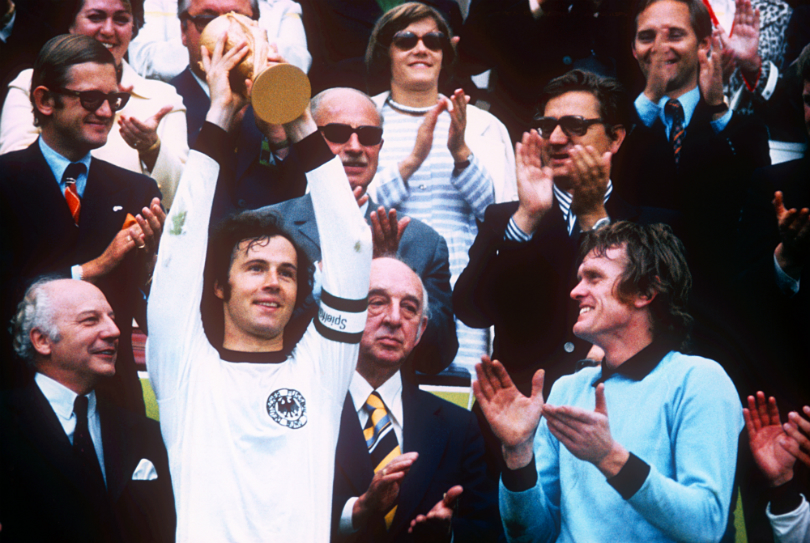
Almost 30 years on, Beckenbauer attended an official banquet with Holzenbein and recounted the story of how the latter had won his Frankfurt team a crucial penalty against Bayern in the German Cup semi-final of 1974 by running against a defender's outstretched leg. Then he addressed the culprit: "But you made up for that in the summer, when you went down again." It was one of those quips Beckenbauer distributes like sweets, but Holzenbein had a sour look on his face.
Many people in Germany will tell you that Holzenbein dived in the 1974 World Cup final. Even more will say the Dutch were undeniably the best team at that tournament. Still, it took those same people years to realise how painfully the Dutch felt the thorn. Maybe because West Germany had often been hard done by in the preceding decades without thirsting for revenge (Gothenburg 1958, Wembley 1966, Mexico City 1970). Maybe because it was only Holland.
The first signs that something was up came four years later when the teams drew 2-2 at the 1978 World Cup, and Holland's Dick Nanninga was sent off after a row with Holzenbein. "He grabbed me by the nose so I pushed him," was how Nanninga described the incident. But Holzenbein said: "When the ref was looking away, he hit me in the stomach. For no reason! That's why I grabbed him."
A similar incident took place at Euro 1980. The Germans won 3-2, but the talking point came when Schumacher and Johnny Rep went up for a cross, and the Dutchman hit the keeper in the abdomen. Schumacher was so enraged that a sub was placed behind his goal to calm him down. Karl-Heinz Rummenigge noted that games between the two countries were having "an electrifying effect".
On the day in June 1988 when the Dutch finally exorcised their demons, beating West Germany for the first time in 32 years, the rivalry spilled over for good. The Germans were hit so hard by losing the semi-final of Euro 88 on home soil that they didn't leave the dressing room for half an hour after the final whistle. "I had to lift my players," said Franz Beckenbauer, looking as if he could use some help himself. "It was no penalty. Never." He didn't mention that the Germans had led through an equally dubious penalty, but he didn't have to. What counted was the image of 15,000 delirious Dutch fans celebrating their victory in Hamburg.
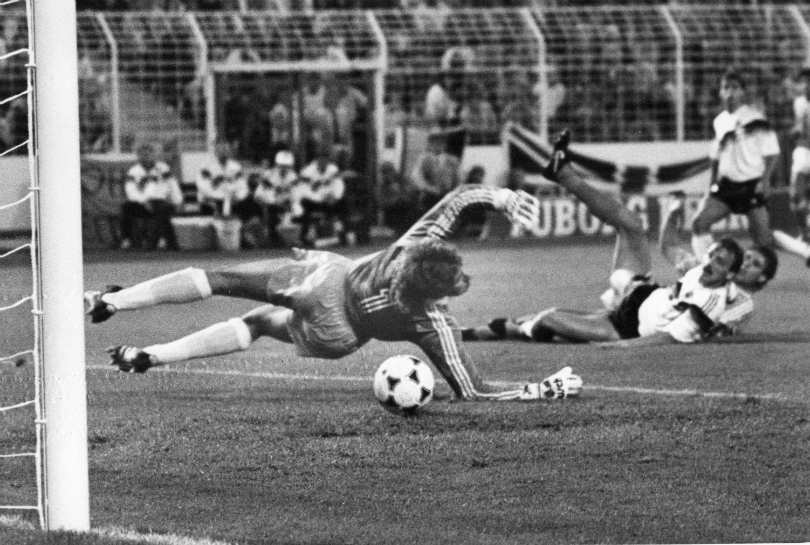
Beckenbauer, who had played when games between West Germany and Holland were just games, boarded the Dutch coach to give his regards to the winners, but most of his players didn't even shake hands with the opposition. They must have felt the Dutch had gone stark raving mad, from throwing insidious punches to chanting about the Nazis. Enough was enough. Yet there was another, subtler aspect to the matter: the verdict of the Dutch newspaper which called the West German team "poor grafters". David had not only won, did not only feel morally superior - he was also very simply better than Goliath.
Which is why a game that many have forgotten lives on in Germany's collective football memory as one of the 10 greatest in our history: the 2-1 win over Holland at Italia 90. The Dutch still had their masters of the delicate touch. We had Augenthaler, Kohler, Brehme and Buchwald. But when Frank Rijkaard repeatedly spat at Rudi Voller, resulting in a red card for him and, bizarrely, the innocent German, the match took on mythic proportions.
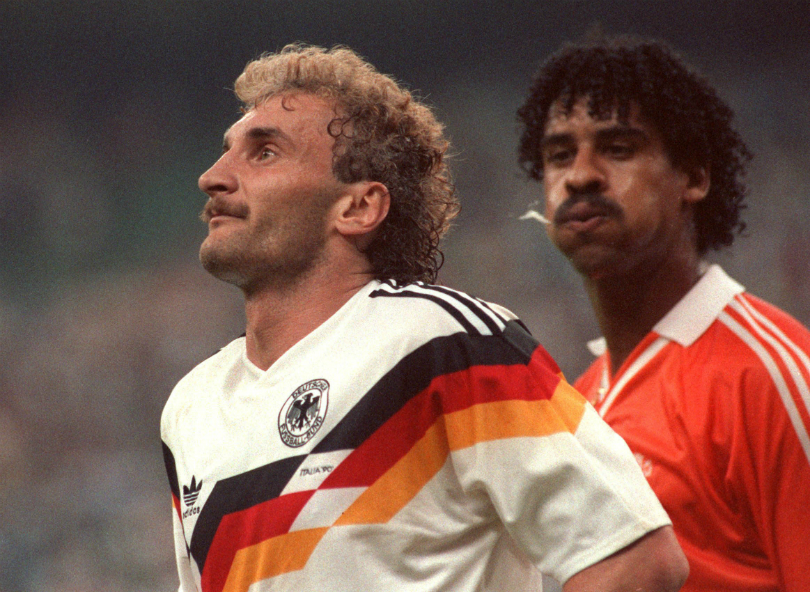
Jurgen Klinsmann, now alone up front, ran his lungs out and would collapse after the final whistle. Buchwald made the first goal with a double stepover. Brehme scored the second with a stunning swerving shot. Then the Argentinian ref awarded the Dutch a silly penalty, whereupon the German TV commentator yelled: "Send that man back to the pampas!" In brief: it was perfect.
Since then, you can't help but feel that the Germans have begun to take the rivalry more seriously than those who started it. In November 1998, the teams drew 1-1 in Gelsenkirchen - but only because the Dutch weren't fired up. "At times they showed us up, even though they didn't have their first team," said Jupp Heynckes. Horst Hrubesch said: "I was shocked how they dominated us in the first half." And Holzenbein added: "It seems German football is in a crisis."
Six years on, it still is. There are serious doubts that Germany can perform at the same level as Holland, which is why the teams' opening game at Euro 2004 will be crucial. Another marvel along the lines of 1990 would again exorcise demons - not ones haunting the Dutch but those plaguing Germans. Like the Dortmund fans thinking how lucky they had been to lose a final in Rotterdam.
The Dutch Viewpoint
by Simon Kuper, author of (among other books) Ajax, The Dutch, The War
Ronald Koeman revealed that after the 2-1 win he had wiped his backside on the German shirt he had swapped with Olaf Thon
The match I hope to be watching on DVD on my deathbed is West Germany v Holland of June 21, 1988. On that summer evening in Hamburg, the Dutch played some of the best football of the era - think Marco van Basten, Ronald Koeman, Frank Rijkaard and Ruud Gullit all at their peak simultaneously - and Van Basten won it with an improbable sliding goal three minutes from time.
Back in Holland, the staid nation surprised itself: on a Tuesday night, nine million people, 60% of the population, celebrated on the streets. It was the largest public gathering since the Liberation. "It feels as though we've won the war at last," said a former Resistance fighter on TV.
Ger Blok, a 58-year-old Dutchman, heard the news in Tegucicalpa, where he was managing Honduras. He ran through the streets carrying a Dutch flag. "Hysterical, intensely happy," he said. "The next day I was ashamed of my laughable behaviour." In the Leidseplein square in Amsterdam, people threw bicycles (their own?) into the air and shouted, "Hurray, we've got our bikes back!" During the Occupation, the Germans had confiscated all Dutch bicycles.
"When Holland scores I dance through the room," said Professor Dr L de Jong, a dusty grey man who had spent the last 40 years writing the official history of the Netherlands in World War II in umpteen volumes. "What these boys have done! Of course it's got to do with the war. Strange that people deny that."
The fact was that until 1988 the football rivalry barely existed.
Ronald Koeman revealed that after the match he had wiped his backside on the German shirt he had swapped with Olaf Thon. Holland's manager Rinus Michels, the man who coined the phrase "Football is war", admitted to "an extra feeling of satisfaction for reasons I don't want to sum up now." Emerging from the tunnel for the second half to jeers from the German crowd, Michels had raised a dignified middle finger.
No relation between the football and war
It is tempting to think that Van Basten (who refused to speak German in interviews) had unleashed a nation's war traumas by scoring in Hamburg, but he did not. The war has less to do with this rivalry than one would think. Before Hamburg, few Dutchmen felt that strongly about Germans. Certainly there was distaste. I lived in Holland for 10 years as a child from 1976, in Leiden near the North Sea, and I could see that German tourists were not greatly popular - "How do the Germans celebrate the invasion of Europe?""By doing it again every summer"- but when England played West Germany in 1982, most of the teenage boys in my class supported the Germans. The fact was that until 1988 the football rivalry barely existed.
Before the war, the Dutch had been mostly philo-Germanic. Many of them spoke excellent German, the way they now speak excellent English, and Dutch books and magazines of the time were full of throwaway quotes from Goethe and Schiller.
After that, from the 1950s until 1970, there was no hope of rivalling Germany: it was a great footballing nation, while the Dutch were pathetic. This was the era of defeats to Luxembourg, and never qualifying for World Cups or European Championships. The big rival in those days was Belgium.
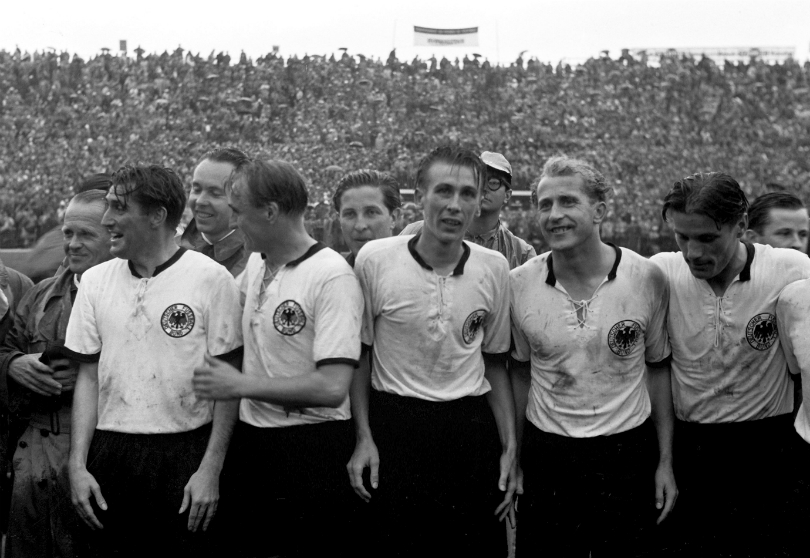
Then suddenly, in 1974, Holland were facing Germany in the World Cup final. No doubt some of the Dutch players that day in Munich had the war in mind. As a baby, Willem van Hanegem, Holland's left-half, lost his father and 10-year-old brother during a British bombardment of his village on September 11 1944. Ruud Krol, the left-back, was the son of one of the few Dutchmen who really had been in the Resistance as opposed to just boasting about it after the war.
In 1999, I visited "Kuki" Krol in Amsterdam. A tiny man, his right foot encased in an outsized boot, Kuki looked nothing like his handsome son. On a table in his living room stood a framed photograph: a dead young man, his brillantined hair combed backwards in the fashion of the 1940s. At the time he had worked in Krol's shop.
Krol told me that at one point during the war, he had hidden 13 Jews above a cafe in Amsterdam. But he had never got over the war. His nerves were shot.
"Some were lucky," said Krol, "but not him. One day the German secret police raided my shop. They came for me, but they found him. He was in the Communist Resistance. They put him against the wall, his hands by his sides, and his bad luck was that he had three identity cards on him that day. He never came back. But they came for me."
Krol told me that at one point during the war, he had hidden 13 Jews above a cafe in Amsterdam. But he had never got over the war. His nerves were shot. The traumas stayed with him until his death last year. This is the atmosphere in which Ruud Krol was raised.
Yet when I asked Johnny Rep whether the war was ever mentioned in the Dutch camp during that World Cup, he replied "Never." Even the defeat in the final passed off calmly. Van Hanegem did leave the field in tears, and the match meant more to him than just any old World Cup final, but the mood of 1988 was absent. In 1974, Dutch and German players seemed of a kind.
The captains, Franz Beckenbauer and Johan Cruyff, were friends, and Rep and Paul Breitner thwarted the FIFA ruling against shirt-swapping on the pitch by trading jacket and tie at the post-match banquet. Jan Jongbloed, the Dutch keeper, wrote in his diary: "Short disappointment that slowly passed into being satisfied with silver." Holland didn't expect to beat the world, or the Germans. Being better than Belgium was quite heady enough.
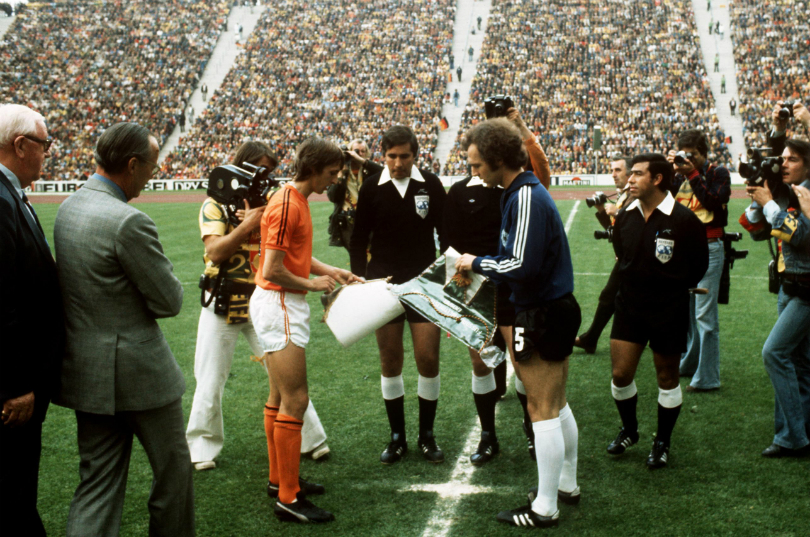
In 1974, the war was a mostly undigested period for the majority of Dutch people. It was still too close, too painful to recall. Only in the 1980s did the war experience a revival in Holland. Holocaust monuments were erected, May 5 again became a holiday marking the Liberation, and in 1985, on the 40th anniversary of the end of the war, dozens of books appeared depicting it as a conflict between "good" Dutchmen and bad Germans. The Dutch were not yet ready to look at their own collaboration: the highest percentage of Jews killed anywhere except Poland, the largest Nazi party outside Germany.
It was in this atmosphere of Good versus Bad that the 1988 match took place. The German team of Lothar Matthaus, Rudi Voller and Jurgen Kohler, violent ugly divers who couldn't play football - not like our boys, anyway - seemed to the Dutch to exemplify "Germany". In a poem, How Deeply It Runs, the cabaretier Erik van Muiswinkel wonders how to explain Good and Evil to his daughter:
Adam, Eve, apple?
Hitler, Florence Nightingale?
I don't know, I'm agnostic
And preferably amoral.
Good and Evil
Look, darling, look at the TV:
Orange, Gullit, White.
White, Matthaus, Black.
Holland vs Germany, Good vs Evil. Our shirts were bright, if unfortunately striped; the Germans wore black and white. We had black players, including Gullit, our captain, and our fans wore Gullit hats with rasta hair; their players were all white and their fans made monkey noises. Our players were funny and natural; A Thousand Years of German Humour is the shortest book in the world, and Voller had that absurd perm. Our players were individuals; the Germans could barely be told apart by their numbers. They dived.

The two teams, in short, summed up the way the Dutch wanted to see themselves and the way they saw the Germans. We were like Gullit and they were like Matthaus. There were obvious flaws to this notion and so, to make it fit, the Dutch briefly forgot their own discipline, their own staidness, and their own intolerance of Turks and Moroccans and Surinamese like Gullit. "We should really explain to the Germans that we hate all foreigners," suggested the magazine Vrij Nederland, but nobody did. The Germans were Evil and we were Good.
The match was, in short, a romanticised version of the war. Since the venue was Hamburg, it was also a symbolic reversal of the German invasion of 1940: an orange-clad Dutch Army drove its cars into Germany and defeated the inhabitants. People in Holland sang: "In 1940 they came / In 1988 we came."
After 1988, Holland v Germany was never the same again. The teams next met at the World Cup of 1990, but this time there was no moral contrast: the bickering Dutch deservedly lost, and moreover Rijkaard spat at Voller. There was a Dutch attempt to claim that Voler had racially abused him - the old story - but Rijkaard inconveniently denied it.
Our 3-1 win at Euro 92 was very enjoyable, but only a reworking of 1988 and it was the last time the countries met in a competitive match. Since then Holland vs Germany has lost much of its fizz for the Dutch (just as the Germans begin to cotton on).
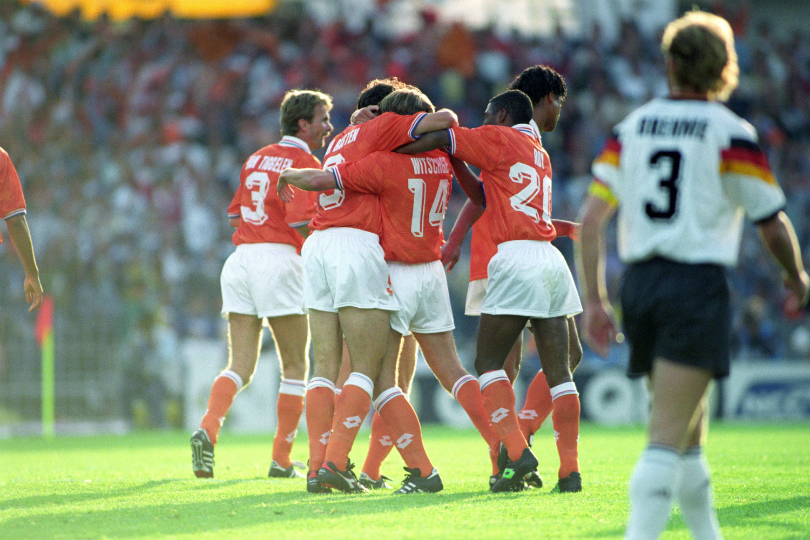
I realised that something had changed in February 2000, when the Germans came to Amsterdam for a friendly. Matthaus gave a sort of grand farewell interview to European journalists. Confusingly, he was friendly and charming, much like his fellow villains Voller and Kohler. I asked why the Dutch disliked him so much. "I'd rather ask the Dutch that," he said. "It continues to be a mystery to me."
I said, "The Dutch hate you because to them you are Germany, you are the team." (I didn't add, "Because they think you are a violent, ugly diver.") Matthaus replied, "So every whistle is really a nice compliment for me?"
But in the stadium two days later, hardly anybody whistled him. He was winning his 144th cap, a world record if you didn't count certain African players, which FIFA didn't, and before the match the Dutch captain Edgar Davids presented him with a bouquet of flowers. Matthaus looked surprised, perhaps because the socially dysfunctional Davids was captaining Holland, probably because he had never expected flowers in Holland. When he waved the bouquet at the crowd, there was far more clapping than booing. The arch-German ("Matthaus = Hitler", said a Dutch banner at a Holland vs Germany game in 1989) had been accepted by the Dutch.
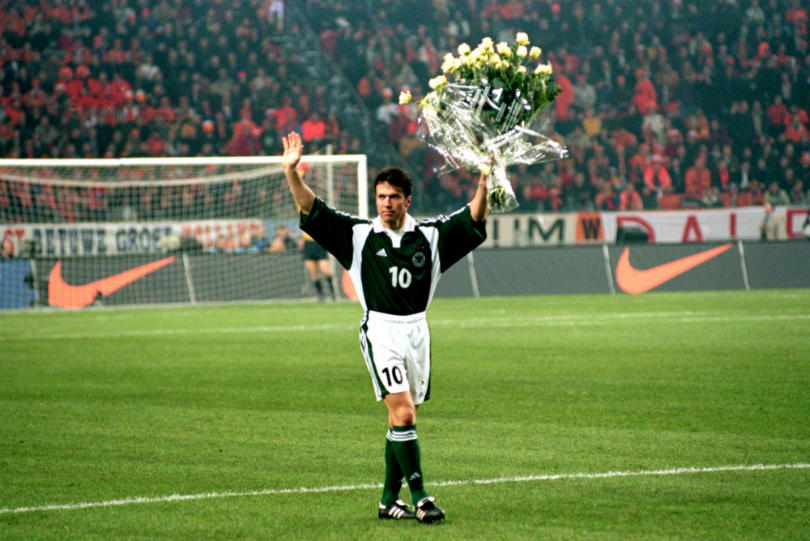
In fact, this was an insult. The Dutch had stopped hating Germans because they had stopped fearing them. When Germany was reunited in 1990, many Dutch feared the huge new country would become a threat again. The German economy was mighty. Even the football team were world champions. But a decade later, Germany had no noticeable foreign policy, a stagnating economy and a terrible football team. Matthaus was nearly 40. Admittedly two years later Germany reached the final of a World Cup for which Holland hadn't qualified, but it didn't matter - they still had a terrible team.
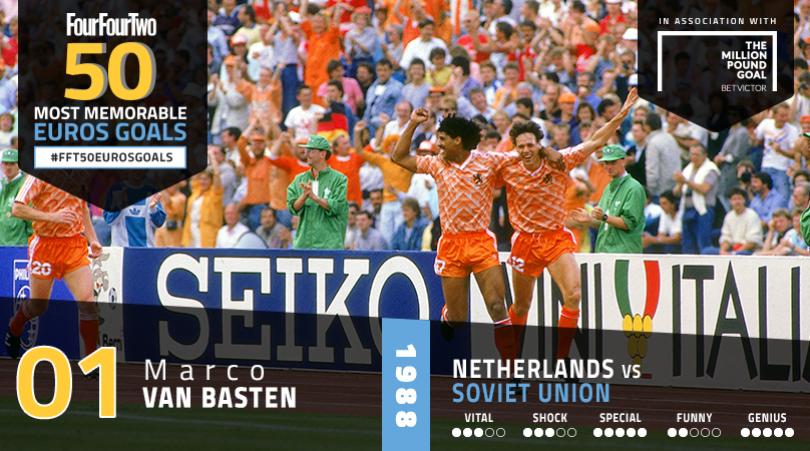
While Germany had ceased to be an Evil Empire, the Dutch no longer believed in their own Goodness. In the 1990s, revisionist books about the Dutch war demolished the myth that everyone had been in the Resistance. The period 1940-45 is now seen as a shameful episode in the nation's history, not something to beat the Germans over the head with.
Nor is it easy to claim that the Germans are racist now the Dutch have a large anti-immigrant party, created by the assassinated homosexual columnist Pim Fortuyn. We still do have black players in our team, but most Dutch people would prefer to see Kluivert, Seedorf and Davids dropped, while Germany have fielded their first black player for two decades (and only the third ever) in Gerald Asamoah.
Oh, for the days of Good versus Evil.
This feature originally appeared in the July 2004 issue of FourFourTwo.Subscibe!
